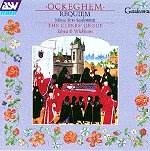OCKEGHEM - Recommended Recordings
(Revised and abridged from review article in The Organ)
all sales links provided
below are to Amazon UK
Until his quincentenary death year, Johannes Ockeghem's name was better
known than his music, except to specialists. Esteemed as pre-eminent in his
own time, subsequently he was dismissed unheard until fairly recently as
a dry contrapuntist, a clever puzzler. Exposure to his masses in excellent
performances and new recordings has proved revelatory. The 1997 Ockeghem
celebration is likely to prove far more significant than those the same year
for Brahms and Schubert, who will remain popular as ever anyway.
Missa prolationum is famous for its astonishing complexity of pitched and
rhythmic canonic devices, with all four 15th century time signatures (prolations)
used in a double canon (anticipating Boulez's total serialism?). Abandoning
the fruitless attempt to hear all of this analytically, the music proves
immensely enjoyable, indeed transparent, when encountered in well prepared
performance. The interest is held by changing vocal textures with varied
combinations, often cleansing the palate by reducing from four to two strands.
It is art which conceals art and speaks easily to our taste, familiarity
breeding admiration and affection.
Edward Wickham, musicologist and bass singer, celebrated the quincentenary
by participating in a learned and fascinating scholarly disputation about
the Missa pro defunctis (the earliest polyphonic Requiem to
survive) at King's College in London, followed by a rare opportunity to hear
his accomplished team, The Clerks' Group, make light of its
difficulties and enchant a large audience with its sheer beauty and unpredictable
fantasy. The mass De plus en plus is based upon a Binchois
chanson prominent as a cantus firmus in the full four voice
sections, with virtuoso passages in between for reduced voices. It can be
savoured in an excellent CD by the always reliable Tallis Scholars directed
by Peter Phillips, coupled with Ockeghem's Missa Au travail suis,
gentle and less overtly demonstrative, each presented with its related
chanson
[Gimell
454 935-2]. A late arrival for the Ockeghem
quincentenary was an excellent Deutsche Grammophon CD of the Missa
de plus en plus coupled with a generous selection of secular chansons
with fascinating texts, as is so often the case for 15th century music. These
use repeating forms, with highly individual cultivation of endless musical
lines [DG
Archiv
453 419-2
*****].
The extraordinary triple canon Prenez sur moi has the voices
each upon different pitches. The four singers of the Orlando Consort are
fully competitive, and the presentation is comprehensive, with impeccable
recorded sound. Only scholars steeped in the period are in any position to
make authoritative comparisons in this rewarding field.

However, the most enduring quincentenary memorial to Ockeghem, revered above
all others in his own time, will undoubtedly be the adventurous and universally
praised four CDs by The Clerks' Group [ASV
Gaudeamus GAU
139,
143,
153
and
168]
which span the main output of this composer, despite there being only a limited
number of surviving works. These are recorded impeccably, capturing the passion
and clarity of the Clerks' Group performances and presented with
substantial informative essays and elegant illustrations from the period.
For a single CD recommendation, I would suggest
[ASV
GAU 168 * * * *
*], which includes the five
part Missa fors seulement from Ockeghem's last decade together with
the astonishing Requiem.
P. Grahame Woolf
see also later review
OCKEGHEM
Masses L'Homme Armé; Sine nomine a3
 The Clerks'
Group/Edward Wickham
The Clerks'
Group/Edward Wickham
 ASV Gaudeamus GAU 204
57'37" [PW]
ASV Gaudeamus GAU 204
57'37" [PW]
